
|
Sale 76
Manuscript Sale
| Lot |
Photo |
Description |
Realized |
Lot 105 |
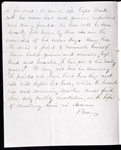 |
Bee, Barnard Elliott, Jr (1824-1861) Confederate general; he was one of the first general officers to be killed in the war. It was Bee who gave Brig. Gen. Thomas J. Jackson the nickname "Stonewall." Autograph document signed "Bee", 2pp, 7¾ x 9¾ in., n.p. (Fort Snelling, Minnesota), c. 1857. Bee writes an obituary for "Capt. James A. Ward of the Third Regiment of Infantry whose death at St Anthony, Minnosota was lately announced…a native of Georgia…graduated at West Point in 1845 and attached to the Sixth Regiment of Infantry…." Bee, who also graduated from West Point in 1845, notes that Ward joined the 3rd Infantry at Vera Cruz and was severely wounded at Cerro Gordo, that he served in New Mexico, where he invented "a valuable improvement in firearms….In social life…his warm heart and generous impulses made many friends; his loss will be more severely felt however by those who were the associates of his earlier days, among these the writer is proud to emumerate himself…." Fine condition with only a couple of small edge separations at folds. Clearly and neatly written.
Bee was breveted twice for gallantry in the Mexican-American War, first at Cerro Gordo, where he was wounded, and then at Chapultepec. After the Mexican-American War, he was posted to garrison duty at Pascagoula, Mississippi, where he served as adjutant, then from 1849 to 1855, was on frontier duty in New Mexico. In 1855 he was posted to Fort Snelling (originally known as Fort St. Anthony), Minnesota and promoted to captain of Company D of the Tenth Infantry Minnesota. In 1857 he was placed in command of the Utah Volunteer Battalion, which took part in the Utah War, and was brevetted to the rank of lieutenant colonel. In 1860, Bee served briefly as commanding officer of Fort Laramie, Wyoming. Bee resigned from the U.S. Army on March 3, 1861, and returned to Charleston where he was elected lieutenant colonel of the 1st South Carolina Regulars. On June 17, 1861, Bee was appointed brigadier general and given command of the third brigade of the Army of the Shenandoah, under Brig. Gen. Joseph E. Johnston. He was mortally wounded at First Bull Run on July 21 and died the next day. Estimated Value $1,000 - 1,500
View details and enlarged photo
| Unsold |
Lot 106 |
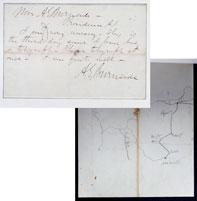 |
Burnside, Ambrose E (1824-1881) Union general; reluctant commander of the Army of the Potomac, relieved of command after Fredericksburg; as commander of the Army of the Ohio, he succeeding in capturing Morgan's Raiders and the siege of Knoxville; was relieved of command of the 9th Corps for mishandling the Petersburg mine assault. Holograph text of a telegraph signed ("A.E. Burnside"), one page, 5 1/4 x 8", n.p., n.d. Almost certainly war date and sent as a telegraph to his wife in Providence, R.I.: "I am very weary. This is the third day since I have had a telegraph. Please telegraph at once. I am quite well." On the verso is part of a hand-drawn map showing a railroad with the towns of Jonesville, Elizabeth, Glasgow, Bowling Green, Gallatin, etc. Light toning and soiling; one small pinhole at fold. Large signature. Affixed at left edge to a 14¼ x 10½" sheet and accompanied by a 14 x 10½" steel engraving by Buttre. Estimated Value $400 - 600
View details and enlarged photo
| Unsold |
Lot 107 |
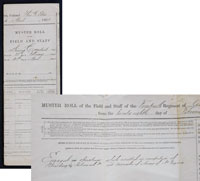 |
Civil War Muster Roll - Connecticut Volunteers, 14th Regt., Field and Staff. Col. Theo G. Ellis in command, February 28, 1865 to April 30, 1865, signed by Company Commander, Chas. E. Penhallow and Inspector and Mustering Officer, Captain J. Frank Morgan, 31 x 21 in. Seven commissioned officers are listed and six non-commissioned staff. Under Remarks, has the handwritten notation: "Engaged in operations which resulted in occupation of Petersburg and Richmond Va. and surrender of Army of No. Virginia." Staining to one blank panel, else very good. Estimated Value $500 - 1,000
View details and enlarged photo
| Unsold |
Lot 108 |
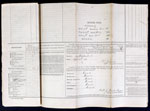 |
Civil War Muster Roll - Connecticut Volunteers, 14th Regt., Co. A. Col. Theo G. Ellis in command, February 28, 1865 to April 30, 1865, signed by Company Commander, Captain William Murlock and Inspector and Mustering Officer, Captain J. Frank Morgan, 31 x 21 in. Fifty-seven men are listed, some of whom are wounded, absent sick, etc., and at least one deserted. Normal toning, else very good. Among the major battles in which the 14th Connecticut engaged were: Antietam, Fredericksburg, Chancellorsville, Gettysburg, Wilderness, Spotsylvania Va., Cold Harbor, Petersburg, and the surrender of Lee's Army. Estimated Value $250 - 500
View details and enlarged photo
| Unsold |
Lot 109 |
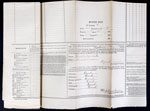 |
Civil War Muster Roll - Connecticut Volunteers, 14th Regt., Co. D. Col. Theo G. Ellis in command,February 28, 1865 to April 30, 1865, signed by Company Commander, Chas. E. Penhallow and Inspector and Mustering Officer, Captain J. Frank Morgan, 31 x 21 in. Fifty men are listed, of whom one is listed as having died, one discharged, six deserted, and three missing in action; others are wounded or absent sick. Written in pencil, which is somewhat faded, but legible. Among the major battles in which the 14th Connecticut engaged were: Antietam, Fredericksburg, Chancellorsville, Gettysburg, Wilderness, Spotsylvania Va., Cold Harbor, Petersburg, and the surrender of Lee's Army. Estimated Value $250 - 500
View details and enlarged photo
| Unsold |
Lot 110 |
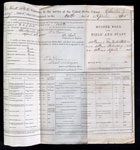 |
Civil War Muster Roll - New York State Volunteers, 108th Regt., Field and Staff. Colonel of the regiment is Charles J. Powers, February 28, 1865 to April 30, 1865, twice signed by Lt. Col. F. E. Pierce, as Commanding the Regiment and as Inspector and Mustering Officer, 31 x 21 in. Listing six commissioned officers and six non-commissioned staff. Very good. There is a monument to the 108th NY at Gettysburg, where it was commanded by Colonel Pierce, and suffered 102 casualties out of the 200 men engaged. The regiment also fought at Antietam, Fredericksburg, Chancellorsville, at Auburn and Bristoe Station, during the Mine Run campaign, in the Wilderness campaign, at Spotsylvania, Weldon's railroad, and in numerous other battles, including the final assault on Petersburg. It fought its last battle at Farmville, just two days before Lee's surrender. Estimated Value $350 - 500
View details and enlarged photo
| Realized
$300 |
Lot 111 |
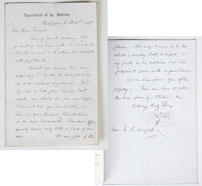 |
Cox, Jacob D (1828-1900) Union general and politician; he was Governor of Ohio (1866-67) and Grant's Secretary of the Interior from Mar. 1869 to Dec. '70 when he resigned due to disagreement with the policies of the administration. He became president of the Wabash Railroad in 1873, was elected to Congress in 1876, and wrote Military Reminiscences of the Civil War and Atlanta (1900) and The March to the Sea--Franklin and Nashville (1882). Letter Signed (J.D. Cox") as Secretary of the Interior, 3pp, on Department of the Interior stationery, Washington, Dec. 2, 1869. To the Hon. G. B. Wright,addressing him as "My dear General." In part: "…We are full of the excitement of an approaching session….Every one anticipates an interesting time & no doubt an earnest effort will be made to solve some of the great problems of finance & taxation. Reconstruction ought to be ended & everything pertaining to it set at rest before spring. Warner is here, and is by far the best of the Senators & Representatives from the southern states. Gen. Grant keeps on the even tenor of his way, as true and fine a man as has ever filled that place. His only desire is to do what is really best & right, & my faith in his motives & in his judgment grows with acquaintance…." Fine. Affixed at left edge to a 14¼ x 10½" sheet and accompanied by a 14 x 10½" steel engraving by Buttre. Estimated Value $250 - 350
View details and enlarged photo
| Unsold |
Lot 112 |
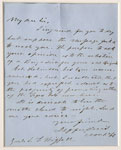 |
Davis, Jefferson (1808-1889) CSA president; he had served as Secretary of War under President Franklin Pierce (1853-57). War-date autograph letter signed "Jeffers. Davis", one page, on blue paper, 6 x 7½ in., n.d., Nov. 1 (18)62. Light creasing, else fine. To General Louis T. Wigfall, Confederate senator from Texas and former Brigadier General of the Texas Brigade. "I inquired for you to day….The purpose to ask your opinion as to the selection of a Brigadier for your old Brigade. Col. [Jerome Bonaparte] Robertson has been recommended but I recollected that you had expressed a doubt as to the propriety of promoting either of the Texas Cols….It is desirable to have the matter closed to night. Send me your advice…."
The Texas Brigade was an infantry brigade organized Oct. 22, 1861. It was intitially under the command of Wigfall (1816-1884), who had a reputation as a hard-drinking, violent man. He fought numerous duels, including one in 1840 with Preston Brooks (1819-1857), the future South Carolina Congressman who gained fame (or notoriety) for savagely beating abolitionist Massachusettes Senator Charles Sumner with a cane on the floor of the U.S. Senate in 1856. Wigfall served in the Texas Legislature, the United States Senate, and the Confederate Senate.
When Wigfall took a seat in the Confederate Senate, John Bell Hood took over command of the Texas Brigade (also known as "Hood's Brigade" or "Hood's Texas Brigade") and served until Nov. 1, 1862, the date of this letter, when Robertson was promoted to take over command. Robertson was known as "Aunt Polly" to his men, because of the care with which he looked out for them. The Texas Brigade fought in all the battles in which the Army of Northern Virginia engaged except for Chancellorsville. Estimated Value $4,000 - 6,000
View details and enlarged photo
| Realized
$6,000 |
Lot 113 |
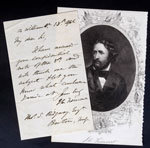 |
Fremont, General John C (1813-1890) Western explorer called "The Pathfinder"; U.S. Army officer who was fired by President Lincoln after Frémont declared martial law in Missouri and ordered the emancipation of slaves in that state; first presidential nominee of the newly-formed Republican Party (1856). Autograph letter signed ("J.C. Frémont), one page, 5 x 8 in., 54 William St. (New York), April 13 (1866 or '67). He writes mysteriously to Thomas S. Ridgway in Boston, "I have received your confidential note. of the 8th and will think over the subject & let you know what conclusion I arrive at. Yours truly J.C. Frémont…" 54 William St., New York, was the address of the Atlantic and Pacific Railroad Company, of which Frémont was president during 1866 and '67. He and some associates bought it from the state of Missouri in June 1866 and reorganized the assets of the railroad as the Southwest Pacific Railroad in August 1866. Less than a year later (June 1867), the railroad was repossessed by the state of Missouri after Frémont was unable to pay the second installment on his purchase.
We don't know who Ridgway was but there were a couple of Thomas Ridgways who were abolitionists, one of whom was a delegate to the Republican National Convention in 1868. Since we can place this letter in the time-period prior to that convention, it is possible that Ridgway was asking Frémont to throw his hat once again into the presidential ring. Estimated Value $300 - 500
View details and enlarged photo
| Realized
$360 |
Lot 114 |
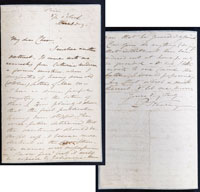 |
Kearny, General Philip (1815-1862) U.S. Army officer who lost an arm in the Mexican-American War and was killed in action at the Battle of Chantilly (1862); renowned for his bravery and recklessness. Autograph Letter Signed ("P. Kearny"), 1½ pp, 5¼ x 8 in., Paris, n.d. (c. early to mid 1850s). To "My dear Chase," regarding the scandal over Kearny's affair with Agnes Maxwell (whom he eventually married after a rancorous divorce from his wife Diana). In part: "I enclose another extract. It came with no remarks from Catherine Anderson, a former mistress whom I suspect of having some old (stolen) letters of Miss M--….first publication having been stopped….I now fear but it will be copied by Salignan's [French magazine]…How can that be guarded against….can you do anything (saying that indictments have been ordered out at home)--only be guarded. or had I better write to our Consul. The latter I would prefer avoiding. Do that which is most discreet & let me know…."
Kearny studied law as a young man but when into the military after inheriting a fortune from his grandfather. He spent time with the French army in Africa (1839-40) and was awarded the Legion of Honor; he then served as aid to General Scott (1841-44) and took part in the Mexican-American War, losing his left arm in battle at Churubusco. He went back to Europe a decade later and received a second decoration of the Legion of Honor. He returned home when the Civil War broke out and was made brigadier-general of volunteers after the battle of Bull Run. He commanded a brigade of New Jersey troops in Franklin's division, Army of the Potomac. On Sept. 1, 1862, at Chantilly, Kearny, who was known for doing his own scouting, ran into some Confederate troops and ignored a demand to surrender. As he fled, a bullet severed his spine and he died instantly. Estimated Value $500 - 750
View details and enlarged photo
| Unsold |
Lot 115 |
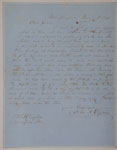 |
Logan, John A. 1826-1886) Union Army, Illinois state senator, and unsuccessful candicate for Vice President of the United States (1884); one of the organizers of the Grand Army of the Republic and one of the most important figures in the movement to recognize Memorial Day as an official holiday. Autograph Letter Signed, one page, 10 x 7¾", Murphysboro (Illinois), Dec. 6, 1849. Written as a 23-year-old lawyer to Thomas Campbell in Springfield regarding problems filing his bond after being elected County Clerk because of resentment that he was a Democrat, and asking for help. Affixed at left edge to a 14¼ x 10½" sheet and accompanied by a 14 x 10½" steel engraving. Estimated Value $100 - 150
View details and enlarged photo
| Unsold |
Lot 116 |
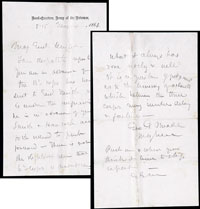 |
Meade, George G (1815-1872) Union major general best known for leading the Army of the Potomac to victory at Gettysburg. Autograph letter signed "Geo. G. Meade" as Maj. Gen., on "Head-Quarters, Army of the Potomac" stationery, 2pp (recto/verso), 8:15, June 4, 1864; with initialed ("GGM") postscript. To Maj. Gen. Wright: "Your dispatch reporting you are in advance of the 18th Corps has been sent to Gen. Smith who is under the impression he is in advance of you. Smith and Hancock are both ordered to push forward. There is not the slightest idea that the 6th Corps is not doing what it always has done early & well. It is a question of judgment as to the timing of assaults which between the three corps may involve delay & failure. Push on & when you think it time to stop report. GGM." Written in pencil; folds and light soiling.
Boatner quotes McMahon's Battles and Leaders: "…Each corps commander reported and complained to General Meade that the other corps commanders…failed to protect him from enfilading fire by silencing batteries in their respective fronts…The three corps had moved upon diverging lines, each directly facing the enemy in its immediate front, and the farther each had advanced the more its flank had become exposed." Boatner adds, "Cold Harbor represents a horrible failure of Federal generalship." Estimated Value $4,000 - 6,000
View details and enlarged photo
| Unsold |
Lot 117 |
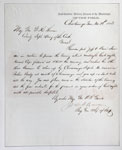 |
Rawlins, John A (1831-1869) Union general; he became President Grant's Secretary of War. War-date Letter Signed ("Jno. A. Rawlins") as Brig. Gen. and Chief of Staff for Gen. Grant, on "Head-Quarters Military Division of the Mississippi. In The Field" letterhead, one page, 10 x 8", Chattanooga, Tenn., Nov. 26, 1863. Written the day after the decisive Battle of Missionary Ridge, to "Maj. Gen. G.H. Thomas, Comdg. Dept & Army of the Cumb[erland]: "Sherman put Jeff C. Davis' Division in motion to pursue the Enemy about midnight last night, Howards Corps followed at 4 a.m. this morning, and ordered his other three Divisions to close up by Chicamauga Depot. He crossed on Reeds Bridge at mouth of Chicamauga and goes up on East side all the way. You will please move in the direction of the Enemy all the force indicated for the pursuit in your orders of last night with all possible dispatch. By order Maj. Gen. U.S. Grant." Affixed at left edge to a larger sheet; old glue remnants on verso, else fine. The loss of Chattanooga was a major blow to the Confederacy and set the stage for Sherman's Atlanta campaign and march to the sea. Affixed at left edge to a 14¼ x 10½" sheet. Estimated Value $250 - 300
View details and enlarged photo
| Realized
$144 |
Lot 118 |
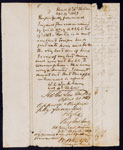 |
Stuart, J.E.B, Fitzhugh Lee, and Others. Manuscript document with endorsements on the verso by Major General J.E.B. Stuart, Brigadier General Fitzhugh Lee (R.E. Lee's nephew), Colonel William C. Wickham, and Colonel Walter H. Taylor (aide de camp of R.E. Lee), all of the 4th Virginia Cavalry, one page, 6¼ x 7¾ in., April 19-24, 1863. Recto has an autograph document signed by Capt. Hobson, Co. F, 4th Reg. Va. Cav. regarding James Foster, a 12-month volunteer in Co. D, 18 Va Battalion of Artillery, who upon the expiration of his original enlistment, claimed to be a British citizen, received his papers from the British Consul, and enlisted in Hobson's company, where he had been a good soldier. Foster's former commander in Co. D, 18th Va. Artillery seems to have accused him of being a deserter, but the officers of the 4th Va. Cavalry all support Foster. On April 19, 1863, Col. Wickham sings Foster's praises: "Foster is a most excellent trooper…Is one of my best men and was not liable to conscription. He is in no way a deserter. I have no doubt but that this application will be refused." Wickham forwards the document to "Fitz Lee / Brig. Genl Comdy" who signs in approval on April 21 and forwards to "J.E.B. Stuart/Major Genl" who approves on April 22 and forwards the document to R.E. Lee's aide de camp, Col. Taylor, who, on April 24, notes that the document was returned to the commanding officer of Co. D, 18th Va. who, we assume, retreated from the fire power of the 4th Va. Cavalry officers.
The document is toned overall, has some marginal chipping, and is silked on the recto (signed by Hobson); Taylor's writing is light but the other endorsements are boldly signed. Estimated Value $6,000 - 8,000
View details and enlarged photo
| Unsold |
Lot 119 |
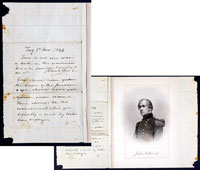 |
Wool, General John E (1789-1869) Veteran of the War of 1812, the Mexican-American War, and the Civil War until his retirement in July 1863. Valuable (and violent) autograph letter signed on verso of an accuser's long letter to this fourth-ranking Federal general (junior only to McClellan,
Fremont & Halleck) of October 31, 1864. The accuser, who only signs with the initials "T.D.D.," refers to "a story being spread that…you told him that Gen, then Lieut. McClellan, assisted by Beauregard planned the attack on the City of Mexico…adopted by a council-of-war, yourself being one of the council." He goes on to accuse Wool of being illicitly involved in securing a "…contract for building one or more Monitors or other ironclads…etc." An irate Wool replies from Troy on Nov. 1, 1864 on the verso of the letter, "There is not one word of truth in this communication. It is a lie from beginning to the end." After signing his name in full, he adds a p.s., stating, in part, because the writer would not reveal his sources, "There should be no concealment when your country is beset by traitors, liars and forgers."
Comes with a fine steel-engraved portrait of Wool. Estimated Value $500 - 600
View details and enlarged photo
| Unsold |
|
|